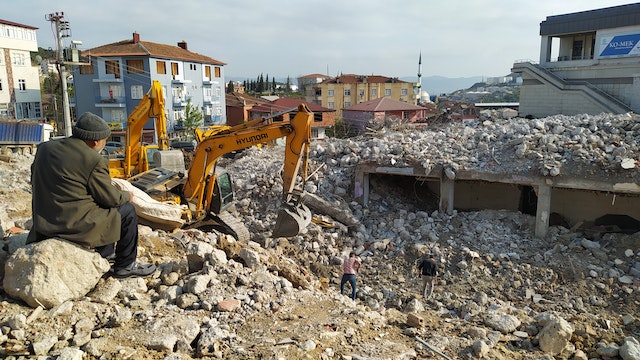Who is Responsible for Building Collapse Injuries and Deaths?
Most of us make certain unconscious assumptions about the safety of the world around us, such as “This building I’m working or sleeping in probably won’t collapse around me. But, recent news events have shaken that assumption a bit. For example:
- During the first week of June, a building under construction in New Haven, Connecticut partially collapsed, injuring eight construction workers. Part of the second floor of the building collapsed into the first floor and the basement.
- In late May, a residential building in Davenport, Iowa collapsed, killing three people and injuring others.
- In 2019, another building under construction–the Hard Rock Hotel in New Orleans–collapsed, killing three workers.
While each of these incidents was devastating, they pale in comparison to the 2021 collapse of the Champlain Towers condominium building in Surfside, Florida. 98 people were killed and several others injured when the multi-story residential building partially collapsed.
Why Do Building Collapses Happen?
Building collapses, like other structural failures, generally occur because someone was negligent. Because so many parties are involved in the planning, design, site inspection, construction, permitting, material supply and maintenance of a building, several parties may share responsibility.
Some possible causes or contributing factors to a building collapse include:
- Faulty design
- Neglecting to inspect or negligently inspecting the building site
- Shoddy workmanship
- Disregard of building codes
- Use of substandard or defective materials
- Modifications of surrounding property that may weaken the foundation
- Negligent maintenance or failure to maintain
Sadly, some of the most serious and destructive building collapses could have been avoided. For example, owners of the Florida condominium building that collapsed were warned that the building was unstable more than two years before the collapse. Renovations were even scheduled, but came too late.
The Massachusetts Building Code
The Commonwealth of Massachusetts sets forth standards for both planning and construction, with certain special requirements relating to residential buildings. Depending on the type of building involved, the property owner may be strictly liable for injuries caused by building code violations. However, Mass. Gen. Laws 143 §51 applies only to “a place of assembly, theatre, special hall, public hall, factory, workshop, manufacturing establishment or building…” The Massachusetts Supreme Court has interpreted this to mean places intended for large numbers of people to gather, whether for entertainment, work, or other purposes.
Note, though, that this restriction applies only to the application of strict liability, meaning that if the injury in one of the listed settings was caused by a building code violation, the injured person need not prove negligence. However, in other settings, violation of a building code may still be introduced as evidence of negligence. So, a person who was injured due to a violation of the building code may still have a strong premises liability claim, even if strict liability does not apply.
Who is Liable for a Building Collapse?
In the Florida case, building residents and surviving family members shared a nearly $1 billion settlement. The parties who paid parts of the settlement included engineers, architects, the condominium association, the city, the owner of a neighboring property that had done work that may have affected the stability of the condo building, and others.
In simple terms, determining liability in a building collapse case or other construction and maintenance related injury case can be complicated. It will typically involve the use of expert witnesses, and there may be several possible responsible parties. The best source of information about who may be responsible for your injuries is an experienced Massachusetts personal injury lawyer.
Workers Injured in a Building Collapse
In Massachusetts, a worker who is injured on the job will typically qualify for workers’ compensation benefits regardless of who was at fault for the accident. This provides a streamlined way for an injured worker to receive medical care and pay for living expenses while recovering from a work-related injury. The trade-off is that injured workers generally can’t sue their employers, even if the employer’s negligence caused the injury. And, the benefits paid by workers’ compensation are more limited than those an injury victim might receive in a personal injury case. For instance, workers’ compensation doesn’t offer compensation for pain and suffering, and doesn’t pay for additional costs triggered by the injury, such as the need for additional child care while you’re recovering.
In some cases, though, the injured worker may be able to file a lawsuit against another party. For instance, in a building collapse case, an injured worker employed by a construction company could pursue workers’ compensation benefits, but might also have a premises liability claim against the building owner, a product liability claim against the manufacturer of defective building materials, or another claim against someone whose negligence caused or contributed to the collapse. If you were injured in an unsafe building while on the job, it’s best to consult an attorney who has experience with both workers’ compensation claims and personal injury cases, to ensure that you receive all of the compensation you deserve.
To learn more about how attorney Kevin P. Broderick can help, call 978-459-3085 right now, or fill out our contact form.
Have you been injured?
Let Attorney Kevin Broderick answer your questions and evaluate your personal injury or vehicle accident case for free!
CALL TODAY 978-459-3085
Kevin Broderick Law serves clients in Massachusetts and
New Hampshire.
Areas of service in
Massachusetts
Lowell
Lawrence
Littleton
Billerica
Andover
Chelmsford
Westford
Groton
Acton
Tyngsborough
Dracut
Methuen
Areas of Service in
New Hampshire
Hudson
Nashua
Pelham
Disclaimer
The information you obtain on this site is not, nor is it intended to be, legal advice. You should consult an attorney for advice regarding your individual situation. We invite you to contact us and welcome your calls, letters, and electronic mail. Contacting us does not create an attorney-client relationship. Please do not send any confidential information to us until such time as an attorney-client relationship has been established.

